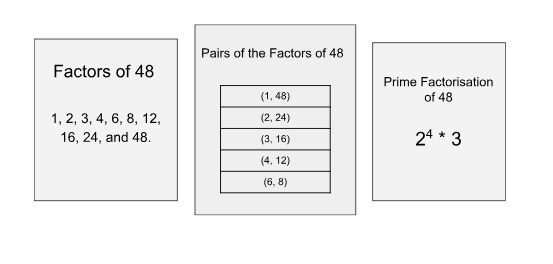Table of Contents
Factors play a crucial role in understanding the fundamental properties of numbers and finding divisors that divide them evenly. This article will delve into the concept of factors and explore their properties and applications, focusing on the number 48. By the end of this article, readers will clearly understand the factors of 48 and how to find the factors of 48.
Definition of Factors
Factors of a number are defined as whole numbers that can divide the given number without leaving any remainder. In simple terms, if a number “m” is divisible by another number “n,” and the result is an integer, then “n” is a factor of “m.”
For instance, in the case of 48, 2 is a factor because 48 ÷ 2 = 24, and 24 is an integer.

Identifying Factors of 48
To find the factors of a given number, such as 48, trial division is employed. Starting with the smallest prime number (2), we continue dividing 48 by progressively larger prime numbers. By applying this method, we can find all the factors of 48, which include 1, 2, 3, 4, 6, 8, 12, 16, 24, and 48.
| Factors | Pair of the factors |
| 1 × 48 | (1, 48) |
| 2 × 24 | (2, 24) |
| 3 × 16 | (3, 16) |
| 4 × 12 | (4, 12) |
| 6 × 8 | (6, 8) |
Prime Factorization of 48
Prime factorization involves breaking down a number into its prime factors, which are the smallest prime numbers that divide the given number without leaving a remainder. The prime factorization of 48 is (24 * 3). This representation is helpful in various mathematical applications, including simplifying fractions and finding the Greatest Common Factor (GCF) and Least Common Multiple (LCM).
Step 1: Begin with the number 48.
Step 2: Divide 48 by the smallest prime factor, which is 2.
Step 3: Now, check if the result (24) can be further divided by 2.
Step 4: Continue dividing by 2 until it is no longer divisible.
Step 5: Divide 6 by 2 again.
Step 6: Since 3 is a prime number that cannot be further divided by any prime number other than 1 and itself, we proceed to divide it by itself.
Step 7: We have reached 1 at the end, and no further division is possible.
Step 8: The prime factors of 48 are the numbers used in the divisions: 2, 2, 2, 2, and 3.
Step 9: We can also express these prime factors as the product of prime numbers: 2 × 2 × 2 × 2 × 3.
Thus, the prime factors of 48 are 2 × 2 × 2 × 2 × 3, or simply 24 × 3, where 2 and 3 are both prime numbers.
Multiplicative Property of Factors
The multiplicative property of factors states that the product of any combination of factors of a number will also be a factor of that number. By combining different factors of 48, we can obtain various products that are also factors of 48.
For example, the factors 48 include 2, 3, and 6, and their product is 2 * 3 * 6 = 36, which is also a factor of 48.
Significance of Factors in Mathematics
Factors are essential in several mathematical concepts and applications. They form the basis for divisibility rules, allowing us to quickly determine if a number is divisible by another number based on their common factors. Moreover, factors are crucial in simplifying fractions, which finds widespread use in algebraic manipulations and solving equations.
Factors are a fundamental aspect of mathematics, and their understanding is crucial in multiple mathematical fields and real-life applications. The factors of 48, including 1, 2, 3, 4, 6, 8, 12, 16, 24, and 48, demonstrate how this number can be divided. Factors facilitate prime factorization, GCF, and LCM calculations and provide valuable insights into solving mathematical problems. By grasping the concept of factors, individuals can elevate their mathematical proficiency and appreciate the elegance of numbers and their properties.
Related Links:
Frequently Asked Questions on Factors of 48
What are the factors of 48?
The factors of 48 are 1, 2, 3, 4, 6, 8, 12, 16, 24, and 48.
What is the sum of the factors of 48?
The sum of the factors of 48 is 124, found by adding all factors of 48: 1, 2, 3, 4, 6, 8, 12, 16, 24, and 48.
What is factor tree of 48?
The factor tree of 48 shows its prime factorization as 2 x 2 x 2 x 2 x 3, breaking down 48 into its prime factors.
What are multiples of 48?
Multiples of 48 are numbers that can be divided evenly by 48, including 48, 96, 144, 192, and so on, increasing by 48 each time.
What are the factors of 48 that are composite?
The composite factors of 48 are 4, 6, 8, 12, 16, 24, and 48. These numbers can be divided by numbers other than 1 and themselves.
How many pairs of factors does 48 have?
48 has 10 pairs of factors: (1, 48), (2, 24), (3, 16), (4, 12), (6, 8), (8, 6), (12, 4), (16, 3), (24, 2), (48, 1).
What equals 48 in multiplication?
48 can be expressed as the product of various pairs of numbers, such as 1 x 48, 2 x 24, 3 x 16, 4 x 12, 6 x 8, 8 x 6, 12 x 4, 16 x 3, 24 x 2, and 48 x 1.





